Author Archives: Tamara
Turn a laundry basket into a strawberry planter!
If you have a spare plastic laundry basket/hamper sitting around somewhere, why not put it to good use and grow strawberries in it? Here’s one way you can do that, though of course many variations are possible.
You’ll need –
- laundry basket/hamper
- soil
- plastic trash bag, burlap, or weed mat
- strawberry starts (look for small ones without a lot of greenery yet, or bare root)
- other plants for the top (optional; you can also just plant more strawberries there)
- scissors
The first step is to add some drainage holes to the bottom of your basket. We used a drill, but if you don’t have one, you could cut some slits with a razor blade, scissors, etc.
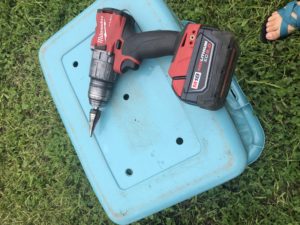
Next, position your plastic trash bag inside to keep the soil from falling out of the holes in the basket. (Alternately, you could use burlap or weed mat, in which case you’d just line the sides, no need to line the bottom.) We cut holes in the bottom of the plastic bag that lined up with the holes drilled in the bottom of the basket.
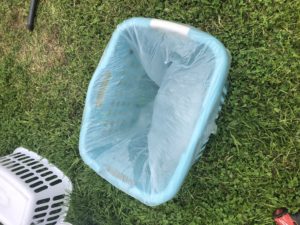
Then you’ll need to add about six inches of soil to the bottom of the basket.
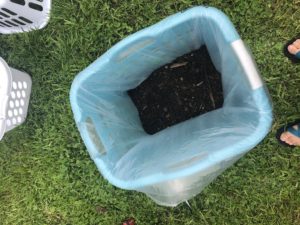
Now you’re ready to place the first round of strawberries. You can place them about six inches apart around the perimeter at the soil level. Just poke a hole into your lining material (plastic/burlap/weed mat) at each spot where you’re going to place a strawberry plant, and carefully place the plant with roots inside and foliage outside in each opening.
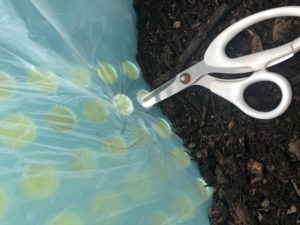
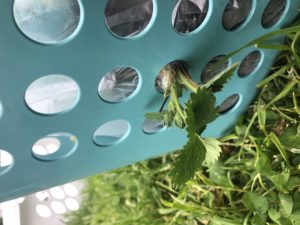
Add another 3-4″ of soil and repeat the process of planting, staggering this row of plants from the first row. Continue until you near the top of the planter. You can finish the project by planting more strawberries on top, or another crop like lettuce, kale, etc. Trim the liner material an inch or so above the soil line.
A note about watering – especially if you’re using a tall laundry basket/hamper, you might want to consider including a way for water to reach the center/bottom of the planter better. One way to do this would be to use a 2 liter soda bottle, cut off the bottom, take off the lid, poke several holes in the sides, and sink it upside-down into the top of the planter until the cut-off base sits right above the soil line. When it’s time to water, add water into this reservoir to encourage it to make its way all the way down to the center and bottom of the planter, ensuring that water reaches the roots of the lower plants, not just those on top. (We didn’t have any large soda bottles so we used the base of a plastic mango container from Costco… something longer and skinnier definitely would have worked better though.) You could also accomplish this by using a length of PVC pipe with holes drilled into it.
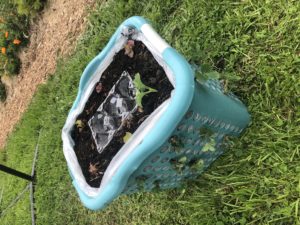
Here’s the finished planter, with about two dozen strawberry plants around the sides, and lettuce and kale on top.
If you attempt this project, please let us know how it goes!
Connecting during COVID
Greetings,
We hope you are as safe and secure as possible during this time of crisis. If you have any needs that we might help with, please visit the Cooperation Humboldt COVID-19 Community Response Needs Request page.
For those of you in a position to volunteer during this time, we have several specific invitations to collaborate and/or engage with Cooperation Humboldt and our COVID response activities.
Mini Gardens
Our food team’s primary focus this season is installing as many mini-gardens as possible for low income residents of Humboldt County. This project is just ramping up, and we’ve installed 18 so far, with almost a hundred more households requesting this service to date. We have a great need for garden installation volunteers – folks who have at least some gardening experience, and who can work semi-independently to deliver and install small (3′ square) garden beds and fill them with soil and plants. Volunteers can take on as few or as many gardens as they like, and of course Cooperation Humboldt will cover all costs.
If you’d like to help, but are unable to be an installer, we also welcome help in any of the following ways:
- Donate plant starts (we’re focusing on crops that are easy for beginners to grow, including lettuce, kale, strawberries, snap peas, cherry tomatoes, etc.)
- Build planter boxes
- Loan a truck for an installation volunteer who doesn’t have one
To learn more about how you can get involved with this effort, contact Tamara at tamara.mcfarland@cooperati
Little Free Pantries
During this pandemic, our Little Free Pantries are being utilized like never before. If you want to help with that project, contact Casey Jo at pheonyx31@gmail.com. And of course, you’re invited to donate non-perishable food and personal care items to any pantry, any time.
COVID Response – Eureka
We are also looking for someone able to take an active role in assisting our COVID response in Eureka. This involves helping to match needs requests with volunteers. If you are interested in learning more, contact David at david.cobb@
Mask Making
Want to join our mask-making team? Have materials to donate? You can sew from home, or come to our physically distanced office space in Bayside (which is sanitized before/after each use) and use a donated sewing machine. Contact Kait at kaitangus@gmail.com.
Learn/Engage
Curious about Solidarity, but isolated? Join us for a video conversation about the concept of Solidarity Economics generally, how Cooperation Humboldt applies those concepts in tangible ways locally, and how you can get involved – next Wednesday, May 6th at 2:00 pm on Zoom. Advance registration is required – click here to register. After registering, you will receive a confirmation email containing information about joining the meeting.
#ShareYourCheck to Ensure Food Security for Our Community
We hope this finds you, your family, and your loved ones as safe and secure as possible during this historic crossroads. We are grateful to live in a community that has come together in this time of crisis to help one another. If you believe that:
-
-
- Food is a Human Right…
- Housing is a Human Right…
- We can build a just, equitable, and compassionate society on the principles of solidarity and mutual aid…
- Each of us can contribute to our community according to our abilities, and receive based on our needs…
- Food is a Human Right…
-
Then we invite you to donate part or all of your $1200 stimulus check to ensure food security for all members of our community.
Join the growing movement to #ShareMyCheck
to support Cooperation Humboldt’s Food Programs
Your donation will:
-
- Aid in the cost of 3′ ready to plant mini gardens
- Provide fresh and healthy food to low income community members
- Provide educational materials and ongoing garden mentorship to impart life-long food cultivation skills
- Ensure both short and long-term food autonomy
We are grateful for your continued support and encourage you to reach out if you have skills or goods to share, or are in need of assistance through our Covid-19 Response team.
In Solidarity,
The Cooperation Humboldt Team
Cooperation Humboldt
707.273.1146
Join us on Sunday, February 23
David’s address is titled “Calling all Visionaries.” He will make the case for peaceful revolution, and outline Cooperation Humboldt’s vision, plan and our efforts to implement it.
Later that afternoon from 2:00-4:00 pm we will host a monthly potluck at The Purple Palace (aka David and Ruthi’s home) located at 1402 M Street in Eureka. This is an informal gathering where we can get to know each other better and support and care for one another as we engage in the difficult work of trying to change our society. All are welcome to join us to connect, deepen relationships, and grow our community.

With hope for a collaborative future for all,
A Movement of Movements

Last week we helped to organize an impressive coalition of 15 local organizations that collaborated in a candidate forum that helped to develop a “movement of movements” approach to the upcoming local election. The event was held at College of the Redwoods, and simulcast on KMUD radio and broadcast on a large screen at the Mateel Community Center in Redway. All seven candidates running for County Supervisor in Districts 1 and 2 participated. (District 3 is also on the ballot this year, but is an uncontested race).
You can watch the entire forum by clicking here.
In Humboldt we vote for County Supervisors in the primaries, which will be held on March 3rd. If any candidate earns 50% +1 of the vote, they win the election. But if no candidate passes the 50% threshold, the top two vote earners go on to a run-off in the November election.
Please be sure to follow us on Facebook and Instagram to stay up to date on how Cooperation Humboldt empowers our community to build a brighter future!
With hope for a collaborative future for all,
Upcoming February Events!
It is in that spirt that we invite you to attend the 3rd annual Artists Dismantling Capitalism Symposium happening on Saturday, February 29 from 9:00am – 5:30pm at the Arcata Playhouse, located at 1251 9th St in Arcata (The Creamery Building).

The day will begin with an Opening Session that includes an interactive performance that imagines shifting from an extractive economy to a regenerative one. Throughout the day 16 participatory workshops will be facilitated by artists, community members and others.
Vegan lunch is included.
Childcare will be provided on request with at least 5 days notice prior to event. Please note in your registration form if you will be needing childcare.
To register, please click here.
Donations to help us cover the costs of the conference are appreciated, but not required.

We also want to invite you another upcoming workshop:
Please be sure to follow us on Facebook and Instagram to stay up to date on how Cooperation Humboldt empowers our community to build a brighter future!
The Cooperation Humboldt Team
Cooperation Humboldt
707.273.1146
EcoNews Feb/March 2020 – ‘Exploring Ecovillages with Cooperation Humboldt’
This article by Tamara McFarland was featured in the February/March 2020 issue of EcoNews.
 The average size of a new house in the United States has doubled since 1960, while the average number of household members has dropped from 3.3 in 1960 to 2.6 today. As our physical footprint per-capita has risen, so too have our nation’s carbon emissions and our rates of social isolation.
The average size of a new house in the United States has doubled since 1960, while the average number of household members has dropped from 3.3 in 1960 to 2.6 today. As our physical footprint per-capita has risen, so too have our nation’s carbon emissions and our rates of social isolation.
One in five US residents report feeling lonely or socially isolated, and this lack of connection can have serious effects on physical health, with researchers reporting that loneliness can be as damaging to health as smoking 15 cigarettes a day. The US Department of Health & Human Services reports that “As a force in shaping our health, medical care pales in comparison with the circumstances of the communities in which we live. Few aspects of community are more powerful than is the degree of connectedness and social support for individuals.”
At Cooperation Humboldt, we understand the critical importance of human connection and interdependence, both for individual quality of life, and as an important way to transition to a sustainable and regenerative way of living with one another and in harmony with the planet. One of the ways we’re currently working to build the world we need is by incubating one or more Ecovillages in Humboldt County.
An Ecovillage is a community with the goal of becoming more socially, culturally, economically, and ecologically sustainable. e idea is to create living arrangements that have a positive, regenerative impact on the natural environment through ethical sourcing of building materials, physical construction and design, and behavior choices.
The Ecovillages we envision will foster mutual support and meet residents’ inherent needs for autonomy and connection with the natural world. They will also provide important economic benefits to residents by empowering them to build equity if desired, and to participate in a democratic process to help make decisions on the issues that affect their lives and housing.
With support from Cooperation Humboldt, we expect that each Ecovillage will be designed by a group of potential residents who would likely coalesce around some kind of theme or shared interest – permaculture, arts/culture, folks with young kids, etc. Over time, we envision creating a local network of ecovillages, each with its own theme and culture.
Each Ecovillage will include features like renewable energy, water catchment, grey water, and edible landscapes – but beyond that, each village is likely to end up looking quite different. Some could be more urban, while others may be more rural; some villages will be made up of completely separate fully featured homes, while others will include tiny homes with larger central shared facilities (or any number of other
combinations of physical features).
Because the specifics around our first project will depend so much on who is going to live there, and what their skills and passions are, we are now in a process to convene one or more groups of folks who would actually want to live at the first Ecovillage. Cooperation Humboldt will offer resources, support, and capitalization, and we require direct participation now from future residents so that we can build this first ecovillage to fit their needs and aspirations.
If you’d like to learn more or join us in this process, please visit cooperationhumboldt.org/ecovillage.